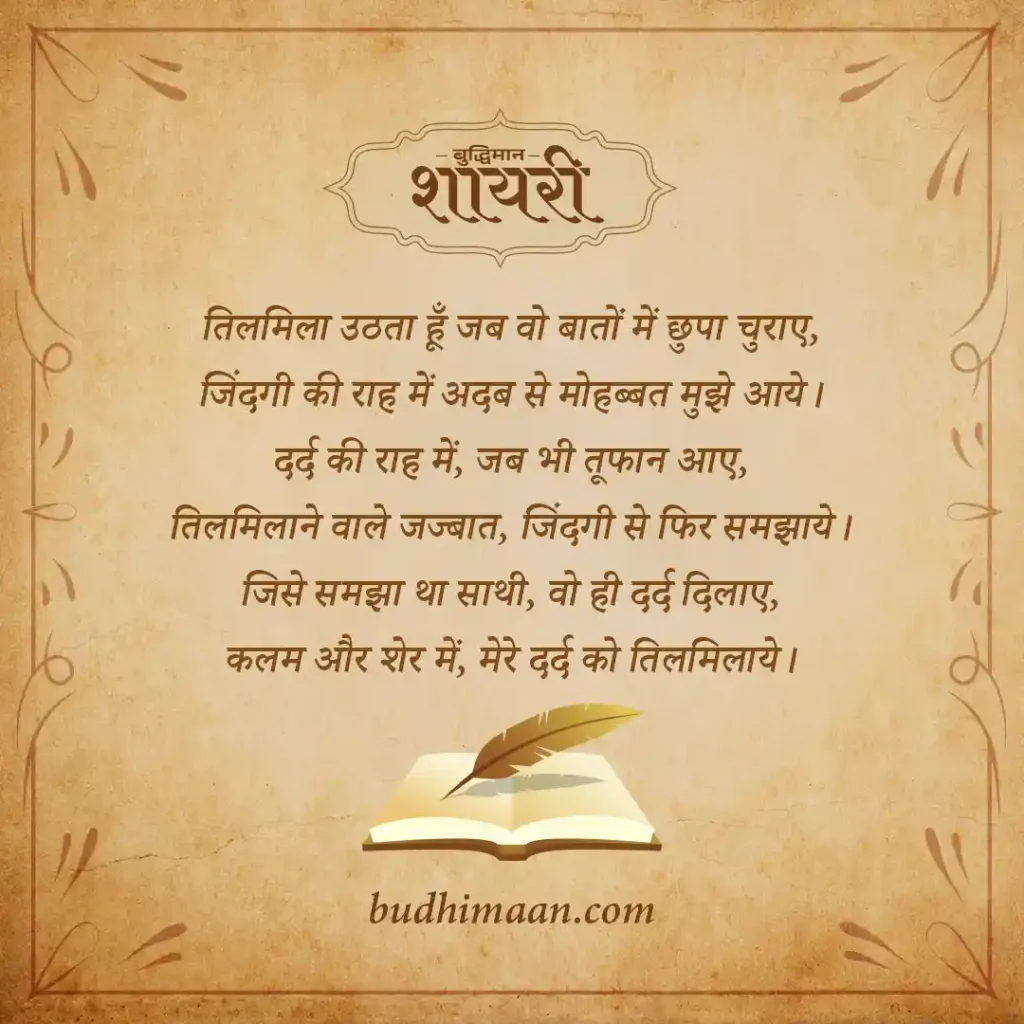परिचय: हिंदी भाषा में कई मुहावरे हैं जिन्हें हम अपनी दैनिक जीवन में प्रयोग करते हैं। ‘तिलमिला उठना’ भी ऐसा ही एक मुहावरा है। आइए, जानते हैं इसका अर्थ और प्रयोग।
अर्थ: ‘तिलमिला उठना’ का अर्थ है जब किसी की भावनाओं में हलचल होती है या वह अपनी भावनाओं को छुपाने में असमर्थ होता है। यह मुहावरा तब प्रयुक्त होता है जब किसी को बुरा महसूस होता है या उसकी भावनाएँ आहत होती हैं।
उदाहरण:
-> जब अभय ने सुना कि उसके सबसे अच्छे मित्र ने उसके पीठ पीछे बुरा भला कहा, तो वह तिलमिला उठा।
-> पारुल के चेहरे पर उसकी आंखों की लाली से साफ़ दिख रहा था कि वह किसी बात से तिलमिला उठी हो।
व्याख्या: ‘तिलमिला उठना’ मुहावरे का प्रयोग विशेष रूप से वहीं होता है जब हम किसी की आहत भावनाओं को दर्शाना चाहते हैं। यह व्यक्ति के अंदर उत्पन्न होने वाले आंतरिक संवेदनाओं को बयां करता है।
निष्कर्ष: ‘तिलमिला उठना’ मुहावरा हमें यह दर्शाता है कि कैसे एक व्यक्ति की आहत भावनाओं का प्रकट होता है। यह मुहावरा हमारे जीवन में कई परिस्थितियों में आता है, जब हम अपनी भावनाओं को रोक नहीं पाते हैं और वह बाहर निकल जाती हैं।

तिलमिला उठना मुहावरा पर कहानी:
अभय और अनुज गाँव के दो दोस्त थे। दोनों बचपन से ही साथ खेलते थे और गाँव में उन्हें अटूट मित्र माना जाता था। एक दिन गाँव में मेला आया। अभय और अनुज ने तय किया कि वह साथ में मेले जाएंगे।
मेले में अभय ने एक सुंदर सा घड़ी देखी जो उसे खरीदनी थी। लेकिन जब वह अपनी जेब में हाथ डाला, तो उसे पता चला कि उसका पर्स गायब है। वह चिंता में पड़ गया।
अनुज ने इसे देखा और सोचा कि वह अपने मित्र की मदद कर सकता है। उसने अभय को कहा कि वह घड़ी खरीदकर देगा। अभय ने खुशी से स्वीकार किया।
कुछ समय बाद अभय को सुनाई गई कि अनुज ने उसकी बुराई की है और कहा है कि अभय बिना मौका पाए ही दूसरों से मदद मांगता रहता है। यह सुनकर अभय तिलमिला उठा। उसकी भावनाएँ आहत हो गई थीं।
अभय अनुज से मिलने गया और पूछा, “तुमने मेरी बुराई क्यों की?” अनुज चौंका और कहा, “मैंने कुछ ऐसा नहीं कहा।” उस समय दोनों को समझ में आया कि किसी तीसरे व्यक्ति ने उनके बीच गलतफहमी पैदा की है।
दोनों मित्र फिर से मिल गए और उन्होंने समझा कि वहां पर किसी तीसरे की जगह उन्हें एक-दूसरे पर पूरा भरोसा करना चाहिए।
इस कहानी से हमें यह सिखने को मिलता है कि जब हम अपने प्रियजनों के बारे में कुछ नकारात्मक सुनते हैं, तो हमें उस पर तुरंत विश्वास नहीं करना चाहिए। ‘तिलमिला उठना’ मुहावरा इसे सही तरीके से बयां करता है।
शायरी:
तिलमिला उठता हूँ जब वो बातों में छुपा चुराए,
जिंदगी की राह में अदब से मोहब्बत मुझे आये।
दर्द की राह में, जब भी तूफान आए,
तिलमिलाने वाले जज्बात, जिंदगी से फिर समझाये।
जिसे समझा था साथी, वो ही दर्द दिलाए,
कलम और शेर में, मेरे दर्द को तिलमिलाये।

आशा है कि आपको इस मुहावरे की समझ आ गई होगी और आप इसका सही प्रयोग कर पाएंगे।
Hindi to English Translation of तिलमिला उठना – Tilmila uthna Idiom:
Introduction: The Hindi language is rich with idioms that we often use in our daily lives. “Tilmila uthna” is one such idiom. Let’s explore its meaning and usage.
Meaning: The idiom “Tilmila uthna” translates to experiencing a surge in emotions or being unable to hide one’s feelings. This idiom is particularly used when someone feels hurt or their emotions are deeply affected.
Usage:
-> When Abhay heard that his best friend spoke ill of him behind his back, he was deeply affected (“tilmila utha”).
-> From the redness in Parul’s eyes, it was evident that she was deeply disturbed (“tilmila uthi”) by something.
Analysis: The use of the idiom “Tilmila uthna” is especially relevant when we want to depict someone’s hurt feelings. It articulates the inner sentiments that arise within a person.
Conclusion: The idiom “Tilmila uthna” illustrates how a person’s hurt feelings manifest. This idiom finds relevance in various situations in our life, especially when we cannot contain our emotions and they come pouring out.
Story of Tilmila uthna Idiom in English:
Abhay and Anuj were two friends from a village. They had been playing together since childhood and were considered inseparable by the villagers. One day, a fair came to the village. Abhay and Anuj decided to visit the fair together.
At the fair, Abhay saw a beautiful watch that he wanted to buy. But when he reached into his pocket, he realized that his purse was missing. He became anxious.
Seeing this, Anuj thought he could help his friend. He offered to buy the watch for Abhay. Gratefully, Abhay accepted.
However, sometime later, Abhay heard that Anuj had spoken ill of him, suggesting that Abhay always looks for opportunities to seek help from others. Hearing this, Abhay was deeply disturbed (tilmila utha). His feelings were hurt.
Abhay approached Anuj and asked, “Why did you speak ill of me?” Anuj was taken aback and replied, “I never said anything like that.” At that moment, both realized that a third person had sown seeds of misunderstanding between them.
The two friends reconciled and realized that they should trust each other completely, rather than relying on the words of a third person.
This story teaches us that when we hear something negative about our loved ones, we should not immediately believe it. The idiom ’tilmila uthna’ aptly expresses this sentiment.
I hope this gives you a clear understanding of the proverb and how to use it correctly
FAQs:
क्या “तिलमिला उठना” मुहावरे का उपयोग केवल गुस्से के लिए होता है?
मुख्यतः यह मुहावरा गुस्से या चिढ़ के संदर्भ में ही प्रयोग किया जाता है।
क्या इस मुहावरे का अर्थ हमेशा नकारात्मक होता है?
हाँ, यह मुहावरा ज्यादातर नकारात्मक संदर्भ में ही प्रयोग किया जाता है।
“तिलमिला उठना” मुहावरे का प्रयोग आधुनिक हिंदी में कितना प्रचलित है?
यह मुहावरा आधुनिक हिंदी में भी प्रचलित है और अक्सर गुस्से की प्रतिक्रिया व्यक्त करने के लिए प्रयोग होता है।
क्या इस मुहावरे का प्रयोग बच्चों की कहानियों में होता है?
हाँ, यह मुहावरा बच्चों की कहानियों में चरित्रों की प्रतिक्रिया या भावना व्यक्त करने के लिए प्रयोग किया जा सकता है।
“तिलमिला उठना” मुहावरे का प्रयोग औपचारिक लेखन में कैसे होता है?
औपचारिक लेखन में इस मुहावरे का प्रयोग बहुत कम होता है क्योंकि यह अधिक भावनात्मक प्रतिक्रिया को दर्शाता है।
हिंदी मुहावरों की पूरी लिस्ट एक साथ देखने के लिए यहाँ क्लिक करें








